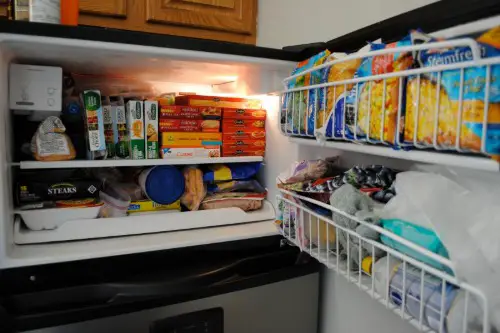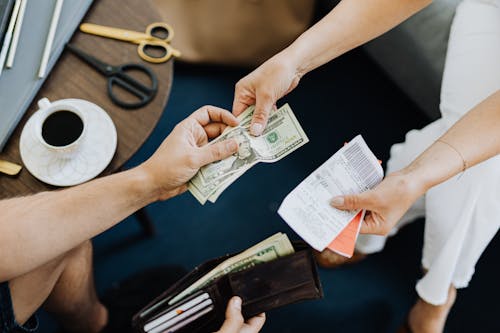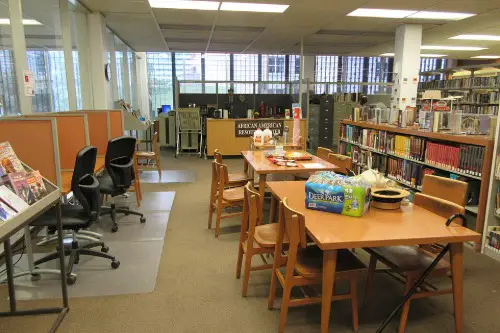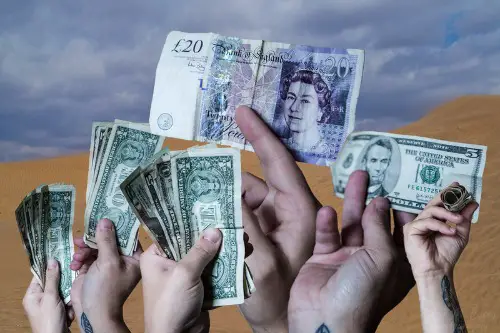1. “Buy in Bulk, Freeze the Rest”

Stocking up on essentials in bulk has gone from a budgeting trick to a full-blown survival tactic. With inflation pushing grocery prices ever higher, Americans are turning to wholesale clubs and stocking freezers like it’s the apocalypse. Meat, bread, and even cheese can be frozen, giving you more control over your food costs week-to-week. It’s not glamorous, but it keeps families fed and fridges full without breaking the bank.
People aren’t just bulk-buying toilet paper anymore—they’re freezing gallons of milk and pre-chopped veggies. The idea is to make fewer store trips and dodge weekly price hikes. Plus, it’s easier to cook at home when you’ve got everything on hand. Less waste, more savings, and fewer headaches.
2. “Side Hustle or Sink”

What used to be extra income is now becoming essential. Americans are picking up freelance gigs, selling crafts online, or even driving for delivery services just to stay afloat. With wages lagging behind inflation, side hustles aren’t about ambition—they’re about necessity. People are trading their evenings and weekends just to make rent.
This shift has turned hobbies into lifelines. A teacher might tutor online at night, while a parent sells baked goods at local markets. It’s hustle culture, but with a distinctly anxious edge. When the 9-to-5 doesn’t cut it, the 5-to-9 takes over.
3. “Cut the Subscriptions—All of Them”

Subscription creep is real, and Americans are finally hitting the cancel button. With streaming platforms, gym memberships, apps, and monthly boxes, it’s easy to lose track of what you’re actually using. A hard look at the credit card statement often leads to a mass purge. Even beloved platforms are getting the boot if they’re not justifying their cost.
It’s not just about saving $10 here or there—it’s about regaining financial control. People are prioritizing essentials and cutting out passive expenses. For some, that means going back to the library instead of Audible or choosing YouTube over Netflix. When every dollar matters, convenience starts to lose its charm.
4. “Cook Everything From Scratch”

Eating out—even fast food—is starting to feel like a luxury. More Americans are going back to the basics: rice, beans, seasonal produce, and making big batches of food that can stretch for days. Cooking at home has shifted from a healthy choice to a financial mandate. Even school lunches are getting DIY makeovers.
This change is about more than savings—it’s about predictability. When you cook at home, you control the portions, the ingredients, and the cost. People are turning to online recipes, TikTok meal preps, and bulk cooking strategies. In tough times, a full pot of soup becomes a symbol of resilience.
5. “Delay Every Big Purchase”

The new mantra? Wait. Americans are postponing car purchases, home renovations, and even replacing old appliances unless it’s absolutely necessary. With interest rates climbing and uncertainty lingering, holding off has become the smarter financial move.
It’s not just fear—it’s strategy. Delaying purchases gives people more time to save, research, and avoid impulsive mistakes. For many, that means patching the roof instead of replacing it, or squeezing another year out of a high-mileage car. Caution is the new confidence.
6. “Live With Roommates—Even in Your 30s and 40s”

Roommates aren’t just for college anymore. With rent prices skyrocketing, adults of all ages are opting to share spaces—even if it means giving up privacy or prestige. Whether it’s friends, siblings, or even exes, co-living is often the only way to stay in a decent neighborhood. The goal is clear: split the bills, survive the economy.
People are redefining what adulthood looks like. There’s less shame and more practicality in choosing shared housing. In cities like New York or San Francisco, it’s almost expected. In a crisis, community beats solitude every time.
7. “Use Cash—It Hurts More”

Digital payments have made spending feel frictionless, and that’s the problem. Some Americans are going back to using physical cash because it creates a psychological barrier—seeing the money leave your hand makes you think twice. The envelope method, a budgeting classic, is back in style. People are separating cash into categories: groceries, gas, fun—and when it’s gone, it’s gone.
This tactic forces mindfulness. Swiping a card doesn’t feel real, but handing over $60 in cash for groceries can be a wake-up call. It’s old-school, but it works, especially for impulse buyers. In times of financial stress, awareness is half the battle.
8. “Fix It, Don’t Replace It”

Repair is back in fashion. Whether it’s patching up jeans, fixing a toaster, or learning to sew a button, Americans are rediscovering DIY maintenance. YouTube tutorials and Reddit threads have become modern toolkits. The idea is simple: if it’s not broken-broken, don’t toss it.
This mindset stretches dollars and builds self-reliance. It also reduces waste and delays costly replacements. Some are even learning basic plumbing or appliance repair to avoid service fees. Crisis mode means every screw, stitch, and duct tape strip counts.
9. “Drive Less, Plan More”

With gas prices still volatile, people are getting strategic about their driving habits. That means batching errands, carpooling, or even downgrading to one vehicle per household. Some are turning to public transit—even if it’s less convenient—because the savings add up fast. Every mile skipped is a dollar saved.
It’s also about mental load: fewer trips mean more time and less stress. Americans are reevaluating what’s “urgent” and planning smarter. Technology helps too, with route-planning apps reducing unnecessary detours. In short, the car has become a calculator.
10. “Call and Negotiate Everything”

In a world of automated billing, it’s easy to forget that humans still work in customer service—and they often have discounts up their sleeves. Americans are calling internet providers, insurance companies, and credit card issuers to negotiate better rates or get fees waived. It’s awkward, but it works. Companies would often rather lower your bill than lose your business entirely.
This tip isn’t just about saving—it’s about reclaiming agency. You don’t need to accept the first price you’re given. Even a 10-minute call can shave off a monthly charge or unlock a promotion. When money’s tight, confidence on the phone can go a long way.
11. “Use the Library Like It’s 1995”

Libraries are having a quiet comeback. They’re not just for books anymore—they offer free movies, audiobooks, internet access, classes, and even tools in some cities. Americans are tapping into these public resources instead of paying for individual subscriptions. It’s about maximizing what’s already available.
More people are realizing their taxes already pay for these benefits. Libraries are community hubs offering real, tangible value. Whether it’s borrowing a museum pass or using free printing, these places are financial lifelines. Frugality meets nostalgia—and it works.
12. “Cancel Credit Cards You Don’t Need”

Unused credit cards can lead to annual fees, overspending temptation, or worse—identity theft. Many Americans are simplifying their financial lives by canceling cards they don’t use regularly. It’s not just decluttering, it’s reducing risk and staying in control. In a shaky economy, fewer open accounts mean fewer things to worry about.
It can also help with budgeting clarity. When you only have one or two cards, tracking spending is much easier. Credit score impacts are usually minor unless you’re canceling your oldest card. But for many, peace of mind outweighs a few points on a credit report.
13. “Talk About Money—Out Loud”

This might be the biggest shift of all. Americans are breaking the silence around money—talking openly with friends, family, even coworkers about budgets, bills, and financial stress. Shame thrives in secrecy, and by talking, people are finding community and advice. It’s no longer taboo; it’s survival.
These conversations lead to real tips, shared resources, and emotional relief. From TikTok finance creators to group chats dissecting grocery hacks, money talk is everywhere. This openness helps people make better choices—and feel less alone. Because in a crisis, connection is as valuable as cash.
This post 13 Financial Tips Americans Are Giving Each Other That Feel Like Crisis Survival Tactics was first published on American Charm.


